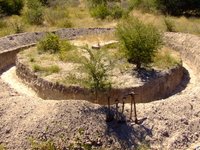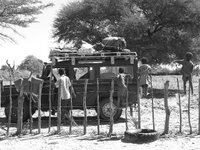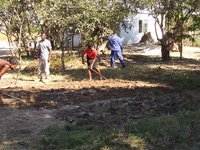Back From The Bush

Spent the last week in the Dobe (or G/hui!'han) area (right next to the Namibian border in the middle of nowhere) doing some project work with TOCADI. The Ju/'hoansi people have acquired land from the government and are starting there own San communitied there. TOCADI is trying to help these people become self-reliant so the Ju/'honsi people will be able to live how they want to, away from the influence of the predominate Tswana culture of Botswana.

The G/hui!'han area is extremely rural, sparse in population, and poor. The Ju/'honsi people there are no longer hunters and gatherers but they are still deeply tied to their traditions and heritage. While I was there I learned about how to get water from a dry water hole, what you can eat from the bush, and a bit about traking animals. Some of the elderly people around Dobe are former hunter and gatherers themselves.

To make these people independent, TOCADI has been funding different projects to make the sommunities self-sustaining and well educated. TOCADI has helped build several wells (like the one pictured below) and has held several educational seminars on how to read and write Ju/'honsi. This past week TOCADI was helping elephant proof a water pump for a future settlement.

When their water holes dry up the elephants smell the water from the pump miles away in the sommunities. When they get there there usually pretty thirsty and like to pull the pumps apart to get to the water inside. Therefore its important to make sure to elephant proof the wells before people start settling there.

To elephant proof the water pump we had to dig a meter wide/sholder deep trench around the well and place poles around center. The idea behind the trench is the elephant will look down and be to afraid to cross. Then the poles keep it from reaching in to the pump. (However I was also told if an elephant really wanted to it still can get in there to the pump and break the poles).

The work was extremely hard to do for a number of reason. We only had a few tools, three shovels and one pic axe, and we were in the middle of the African wilderness which meant sweltering hot days and freezing cold nights.

Our crew was comprised of 5 community members, the TOCADI Dobe team (Joyce, Damo, and Myself), and our driver Charlie. It took us three days to complete the digging. After that we went deeper into the bush to cut down a tree for poles. However we didnt have enough time, energy, or resources to put the poles up so we concluded there. This was what it looked like when we were done.

The trip to the Dobe area was a long one. It took around 400 km to get there, 200 of which were rural dirt roads. After taking such a beating forging through the African bush our Land Rover decided to stop working 60 km away from the main road. Luckily we were able to hitch-hike back into Shakawe on the back of an old rusty flatbed semi-truck which spewed gas and exhaust fumes all over us. Dont worry. Im now safe and sound in Shakawe.
Sala Sentle
Travis

ps here are some b+w's i took of people and stuff. i thought they looked kind of cool.










